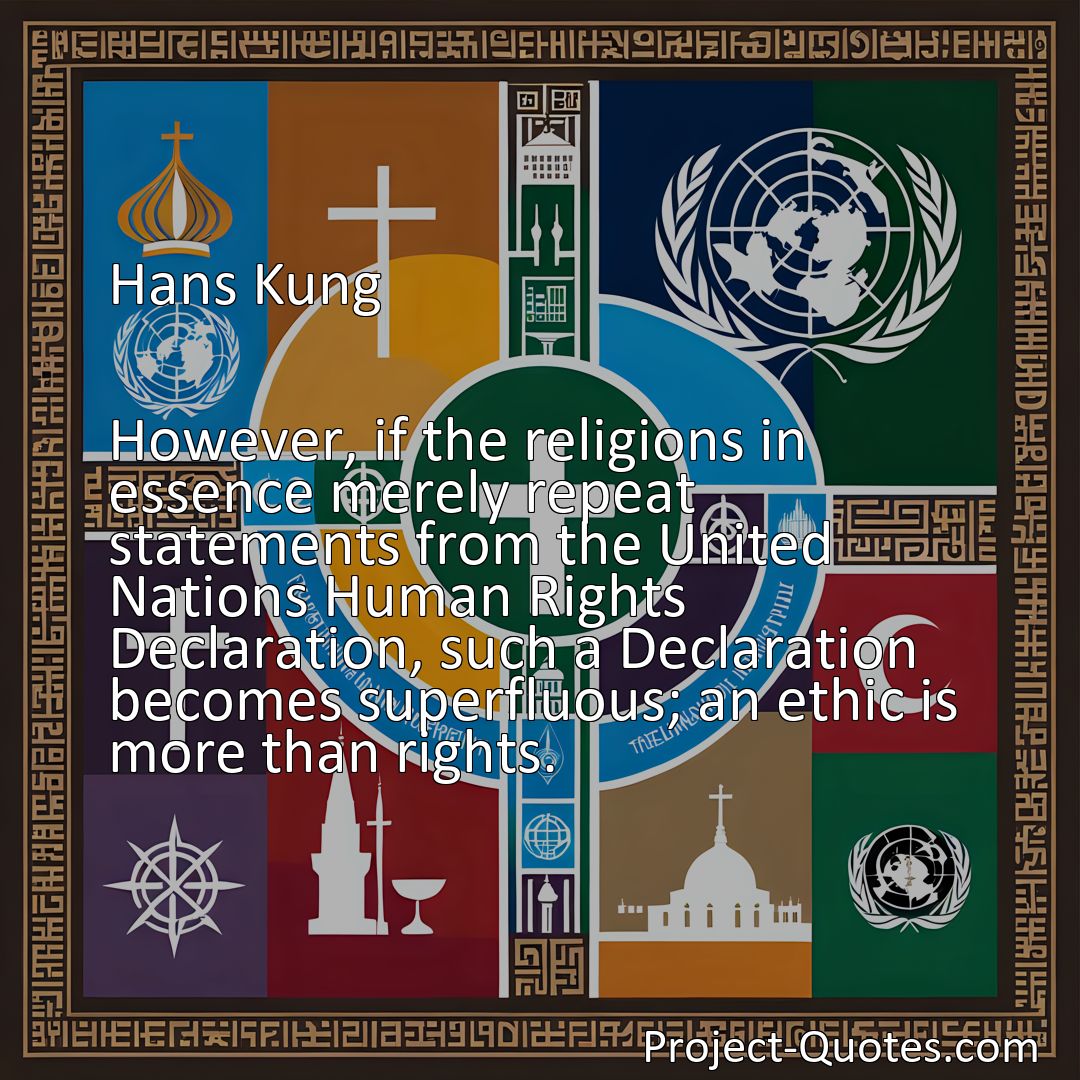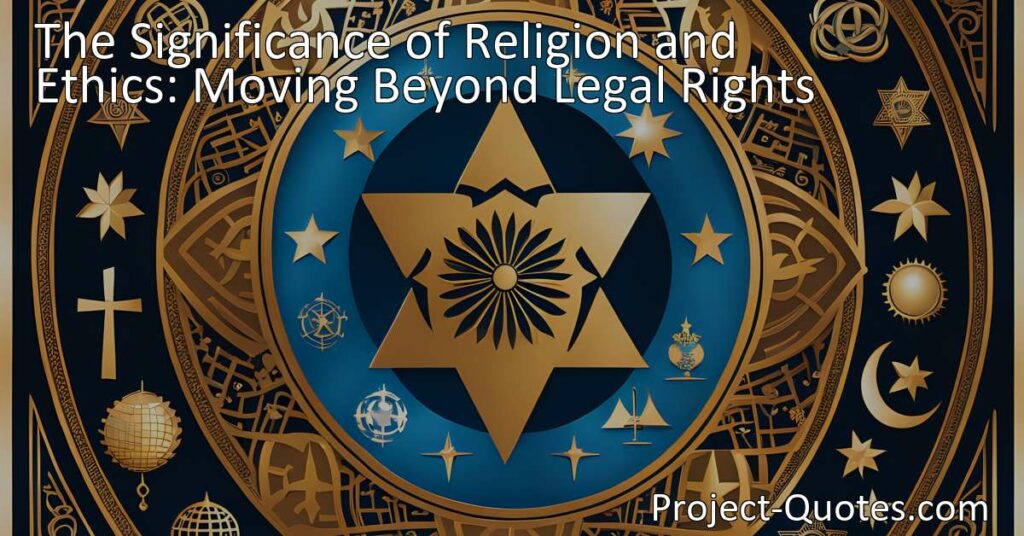However, if the religions in essence merely repeat statements from the United Nations Human Rights Declaration, such a Declaration becomes superfluous; an ethic is more than rights.
Hans Kung
In today’s diverse world, religions go beyond legal rights and offer comprehensive principles that guide individuals in finding meaning, purpose, and moral values. Religion and ethics are interconnected, emphasizing personal transformation, virtues, and a deeper sense of responsibility. Beyond legal rights, religions address moral blind spots and influence positive change in society, promoting dialogue, understanding, and unity. An ethic encompasses the profound spiritual and moral journey that religions facilitate, going beyond mere rights.
Table of Contents
Meaning of Quote – However, if the religions in essence merely repeat statements from the United Nations Human Rights Declaration, such a Declaration becomes superfluous; an ethic is more than rights.
Introduction:
In today’s diverse and interconnected world, the question arises as to whether religions only restate the principles outlined in the United Nations Human Rights Declaration. However, it is vital to understand that an ethic goes beyond rights and encompasses a broader and more profound understanding of morality, spirituality, and personal growth. In this article, we will explore the significance of religion and ethics, how they complement each other, and why an ethical framework is vital for a just and harmonious society. Let’s delve deep into this fascinating subject!
The Essence of Religion:
Religion is a deeply personal and spiritual belief system that guides individuals, families, and communities in finding meaning, purpose, and moral values. It is important to note that religion extends beyond a mere repetition of human rights declarations. Religions, be it Christianity, Islam, Hinduism, Buddhism, or any other faith, offer a comprehensive set of principles and teachings that encompass various aspects of human existence.
Religion and Ethics: An Interconnected Relationship:
Although religions can share certain moral values with the United Nations Human Rights Declaration, it is essential to highlight that religions emphasize a holistic understanding of ethics, encompassing spiritual and ethical growth as well. Ethics, derived from religious principles, forms the foundation of social norms, individual conduct, and interactions among individuals. Religions provide a moral compass, guiding individuals to navigate the complexities of life beyond a mere adherence to legal rights.
Beyond Rights: Dimensions of an Ethical Life:
An ethical life embraces virtues such as compassion, integrity, honesty, empathy, and respect for all beings. While the United Nations Human Rights Declaration primarily focuses on establishing legal rights, religion and ethics broaden the perspective, emphasizing personal transformation and cultivation of values that surpass legal obligations. This expansion allows individuals to develop a deeper sense of personal responsibility, empathy towards others, and a commitment to social justice.
Religion as a Catalyst for Ethical Growth:
Religions provide a framework that encourages personal growth and ethical development. Through rituals, scriptures, and teachings, religions offer guidance on how to live a principled life, finding one’s purpose, and contributing positively to society. They encourage believers to go beyond legal rights and embrace morality as a way of life. For example, the Sermon on the Mount in Christianity teaches not only forgiveness but also loving one’s enemies, an ethic far surpassing mere adherence to legal rights.
Religions Addressing Moral Blind Spots:
While the United Nations Human Rights Declaration serves as a crucial document promoting universal human rights, religions often address moral blind spots not fully covered by legal frameworks. They tackle complex issues such as forgiveness, reconciliation, ethical decision-making, and the intrinsic worth of every human being. By doing so, religions provide deeper insights into the complexities of human existence and offer guidance on how to navigate moral dilemmas.
The Power of Religion in Shaping Societal Values:
Religions, due to their spiritual and moral authority, have a profound impact on shaping societal values and ethics. They promote unity, community welfare, and a sense of belonging among their followers. Religious institutions often champion human dignity, the eradication of poverty, gender equality, and environmental stewardship. These values extend beyond the United Nations Human Rights Declaration, reinforcing the notion that an ethic encompasses more than just legal rights.
Religion and Ethics: Influencing Positive Change:
An ethic acts as a guiding principle for personal conduct, decision-making, and forging harmonious relationships both at an individual and societal level. As religious teachings inspire ethical behavior, the transformation occurs within individuals, leading to positive change in society. Furthermore, religions often guide individuals towards active participation in philanthropy, volunteerism, and social justice movements that transcend the scope of legal rights.
Promoting Dialogue and Understanding:
Beyond legal rights, religions emphasize the importance of dialogue, understanding, and mutual respect. By engaging in interfaith dialogue, individuals from different religious backgrounds come together to share their perspectives, learn from one another, and find common ground. Such conversations facilitate a deeper understanding of diverse beliefs, nurturing compassion and empathy, and fostering unity in a world that is increasingly interconnected.
Conclusion:
While the United Nations Human Rights Declaration plays a crucial role in advocating for equality and justice, it is vital to recognize that religion and ethics extend beyond the realm of legal rights. Religions provide comprehensive frameworks that guide individuals towards personal growth, moral values, and a higher sense of purpose. Embracing an ethical life, as inspired by religious teachings, enables individuals to transcend legal obligations and cultivate virtues that contribute to a just and compassionate society. Let us remember that an ethic is indeed more than rights and encompasses the profound spiritual and moral journey that religions facilitate.
Freely Shareable Quote Image
I hope this quote inspired image brings you hope and peace. Share it with someone who needs it today!


